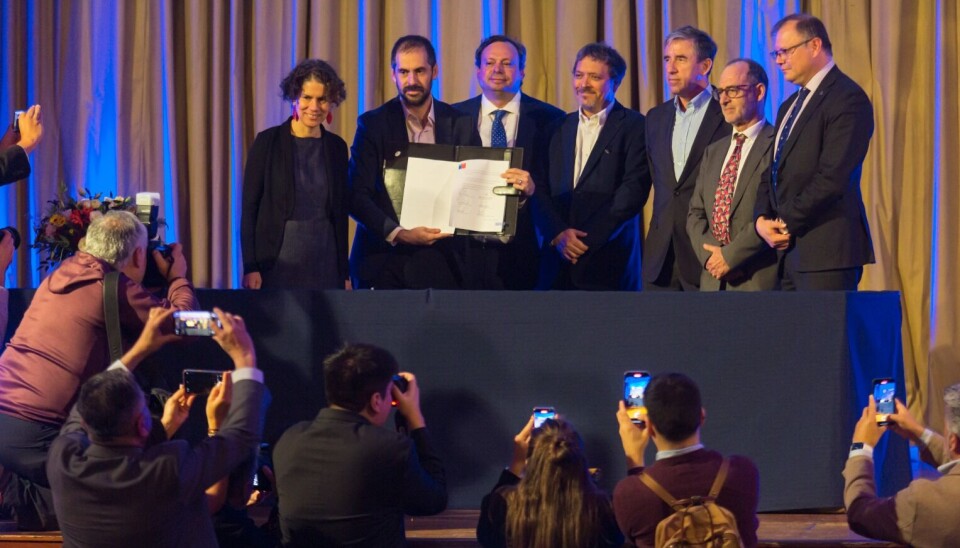
AquaChile signs commitment for voluntary relocation of salmon farms
Deal aims to speed up move from national parks
Chile’s biggest salmon farmer, AquaChile, and Canadian-owned Cooke Aquaculture Chile have signed an agreement that should speed up the relocation of fish farms from three of the four national parks where salmon production takes place.
The Chilean government, through the Ministry of Economy, Ministry of the Environment, and the Ministry of Defence, is also party to the agreement, reports Fish Farming Expert's Chilean sister site, Salmonexpert.cl.
Fish farmers have in the past complained that they have been unable to relocate because of government red tape. Under the new deal, priority will be given to the voluntary relocation of the nine aquaculture concessions that operate in or near the Isla Magdalena, Laguna San Rafael and Bernardo O’Higgins national parks.
The different state entities will be coordinated to respect the acquired rights of farmers and the development of farming within current regulations, while the relocation of the concessions is carried out.
A clear path
A roadmap that considers this and other specific matters will also be drawn up in order to continue advancing in the development and sustainable growth of the salmon sector.
Chile’s economy minister, Nicolás Grau, valued the signing of the commitment.
“It allows us, in three of the four national parks, to define a clear path so that salmon farming can move to other areas that are not protected,” he said.
Environment minister Maisa Rojas, an Oxford-educated physicist who recently confirmed her commitment to removing farms from protected areas despite the idea being rejected by Parliament, said: “This protocol of agreement is a demonstration that we can sit at the same table to work together and that we can reach an agreement on common objectives.
“As a country, we need the industry to take decisive steps towards sustainability.”
Better farm distribution
AquaChile general manager Sady Delgado said the commitment was very important because it is voluntary and allows for better ordering of the geographical distribution of the activities carried out in the south of Chile.
“I think salmon farming is coming out stronger, with a clear message to do it better every day, continue growing, generate business opportunities, progress jobs for the national population," said Delgado.
Cooke Aquaculture Chile general manager Andrés Parodi said that the decision to participate in the so-called “Public-private commitment for the effective protection and conservation of national parks and their adjacent areas” was made “despite the fact that we have differences with the authority regarding the classification of the area where our concessions are located and as a sign of collaboration and willingness to reach agreements between the public and private sectors”.
He added: “It is very important to establish that Cooke does not have any of its operations located in protected areas and that our participation in this agreement is inspired by overcoming the divergences with the SMA (state environment agency). We trust that, just as the Ministries of the Environment, Economy and Defence have done, we will be able to build together, and with a collaborative spirit, a process of understanding that benefits the environment, our collaborators and the communities near our operations.
“We are confident that, as a result of this good faith agreement, during the transition period until its complete implementation, we will be able to preserve the source of work for our collaborators, maintaining the current operations of the Huillines 2 and 3 centrs. That was precisely the spirit that allowed us to reach this agreement.”
Dialogue works
Arturo Clément, president of salmon farmers’ organisation SalmonChile, said the public-private commitment would allow salmon farming companies that have operations in them to leave national parks through relocations.
“This matter has been promoted by our union for a long time, so we highlight the signing of this commitment,” added Clément.
“We also value the commitment that the State assumes to accelerate relocation processes for these purposes. This is proof that with dialogue and cooperation we can move forward together towards the challenge of working towards sustainable salmon farming. And it is also proof that - as we have maintained - salmon farming, respect for the environment and the right of the inhabitants of southern Chile to prosper are compatible.”






















































